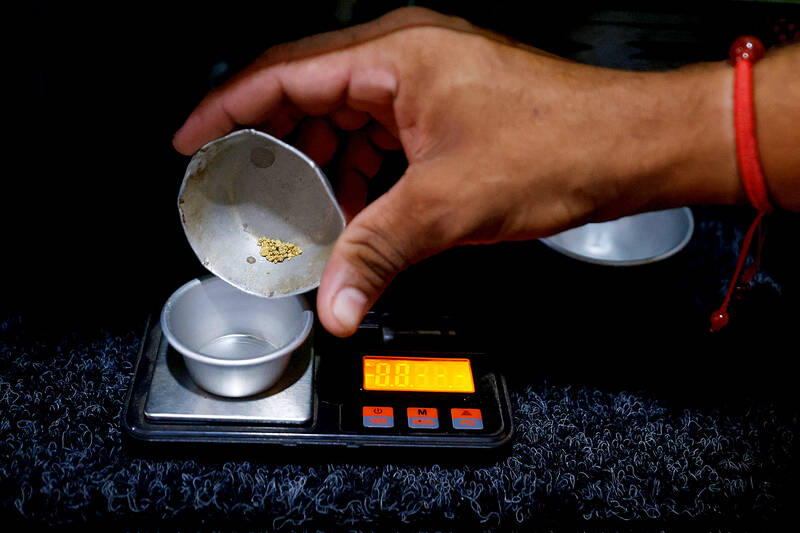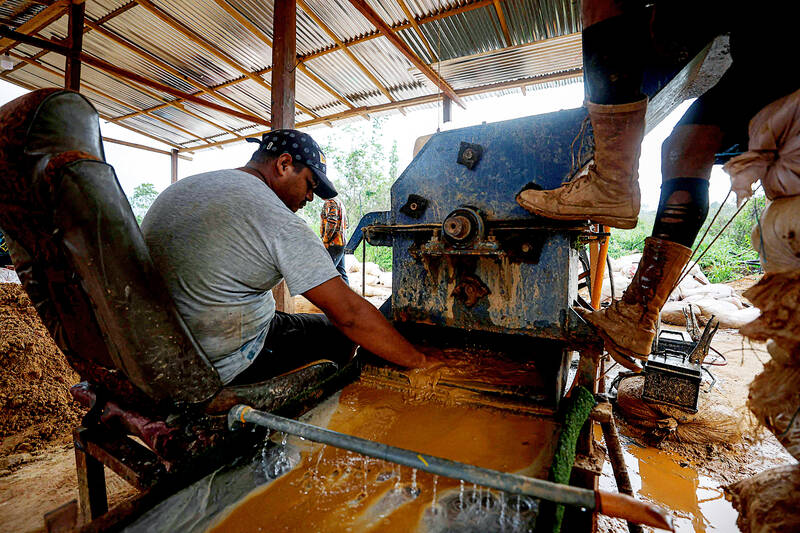In the Venezuelan mining community of El Dorado, the majority of residents carry around gold instead of cards or cash to pay for groceries.
They live in a town named after the mythical City of Gold and untold riches — but most of them are poor.
Merchants use scales to carefully weigh the flecks people guard in plastic pill bottles or wrapped in pieces of paper, and market goods are priced in weight of gold.

Photo: AFP
For 0.02g, you can get a small packet of corn meal, and for 1g a pre-packaged bag of groceries that includes flour, pasta, oil, margarine, ketchup and milk powder.
A gram of gold can purchase between US$85 and US$100 worth of goods, but takes hours of back-breaking work to amass. If you are in luck.
“Gold is a blessing given to us, so we can buy what we want, but you have to work hard,” 48-year-old Jose Tobias Tranquini said in the town of 5,000 residents mostly employed in mining — legal and illegal.

Photo: AFP
“One day at the mine you might find nothing; there are lucky people who have gotten up to a kilo, but ... I haven’t had that kind of blessing. I’ve only gotten a little bit,” Tranquini said.
El Dorado’s residents have limited access to banking services. They could sell their gold at one of the dozens of dealers that dot the streets, but most prefer not to. Gold — unlike the battered Venezuelan currency that has lost 50 percent of its value this year — does not depreciate.
El Dorado arose as a military fort as Britain and Venezuela squared off in 1895 over the mineral and oil-rich region of Essequibo — now at the center of an increasingly heated territorial dispute with Guyana, which has administered it for decades.
The oldest inhabitants of the town remember that when it rained, particles of gold emerged from the town’s clay streets.
Nowadays, the streets are tarred, though potholed, and the population rely for transport mainly on motorcycles that zoom noisily to and fro.
Hilda Carrero, a 73-year-old merchant, arrived in El Dorado 50 years ago in the midst of a gold rush.
The town was just “jungle and snakes... It was ugly,” she recalled.
Carrero sells cans of water for 0.03g of gold apiece — about US$1.50 — but business, like mining hauls, is erratic. Some days she sells nothing.
“If I don’t have gold, I have no life,” Carrero sighed.
It can be hard to make a living in a place where abundant reserves of gold, diamonds, iron, bauxite, quartz and coltan have attracted organized crime and guerrilla groups that mine illegally, and sow violence.
Extortion of small business owners is rife, and 217 people were killed in the four years to 2020 in clashes between rival criminal gangs.
Environmentalists also denounce an “ecocide” in the heavily exploited area, and mine collapses have claimed dozens of lives.
Around El Dorado, there are numerous camps processing the gold-laden sand that miners dig up daily.
In tall sheds with zinc roofs, mountains of sand are milled in machines that work with modified car engines, then washed in water and toxic mercury to separate the gold from other metals. Tiny particles almost imperceptible to the naked eye are trapped in a green mat which is shaken out to collect them.
The granules are finally heated with a blowtorch to remove impurities before the gold can be traded or sold.
It is hard work, and hazardous.
“The danger of this is the smoke” produced by the mercury burning off, a mill owner explained while smoking a cigarette.
A family of five working at a mine visited by AFP spent four hours that day processing a ton of sand.
For their efforts: 1g of gold.
“We’ll use it to buy food and whatever is needed at the mill,” a worker who asked not to be named said, as he cupped a tiny grain of gold in coarse hands.
It was a good day.

VAGUE: The criteria of the amnesty remain unclear, but it would cover political violence from 1999 to today, and those convicted of murder or drug trafficking would not qualify Venezuelan Acting President Delcy Rodriguez on Friday announced an amnesty bill that could lead to the release of hundreds of prisoners, including opposition leaders, journalists and human rights activists detained for political reasons. The measure had long been sought by the US-backed opposition. It is the latest concession Rodriguez has made since taking the reins of the country on Jan. 3 after the brazen seizure of then-Venezuelan president Nicolas Maduro. Rodriguez told a gathering of justices, magistrates, ministers, military brass and other government leaders that the ruling party-controlled Venezuelan National Assembly would take up the bill with urgency. Rodriguez also announced the shutdown

Civil society leaders and members of a left-wing coalition yesterday filed impeachment complaints against Philippine Vice President Sara Duterte, restarting a process sidelined by the Supreme Court last year. Both cases accuse Duterte of misusing public funds during her term as education secretary, while one revives allegations that she threatened to assassinate former ally Philippine President Ferdinand Marcos Jr. The filings come on the same day that a committee in the House of Representatives was to begin hearings into impeachment complaints against Marcos, accused of corruption tied to a spiraling scandal over bogus flood control projects. Under the constitution, an impeachment by the

Exiled Tibetans began a unique global election yesterday for a government representing a homeland many have never seen, as part of a democratic exercise voters say carries great weight. From red-robed Buddhist monks in the snowy Himalayas, to political exiles in megacities across South Asia, to refugees in Australia, Europe and North America, voting takes place in 27 countries — but not China. “Elections ... show that the struggle for Tibet’s freedom and independence continues from generation to generation,” said candidate Gyaltsen Chokye, 33, who is based in the Indian hill-town of Dharamsala, headquarters of the government-in-exile, the Central Tibetan Administration (CTA). It

China executed 11 people linked to Myanmar criminal gangs, including “key members” of telecom scam operations, state media reported yesterday, as Beijing toughens its response to the sprawling, transnational industry. Fraud compounds where scammers lure Internet users into fake romantic relationships and cryptocurrency investments have flourished across Southeast Asia, including in Myanmar. Initially largely targeting Chinese speakers, the criminal groups behind the compounds have expanded operations into multiple languages to steal from victims around the world. Those conducting the scams are sometimes willing con artists, and other times trafficked foreign nationals forced to work. In the past few years, Beijing has stepped up cooperation